HAPPY NEW YEAR 2024 click here
FOOD DISTRIBUTION 2021 click here
BLANKET DISTRIBUTION click here
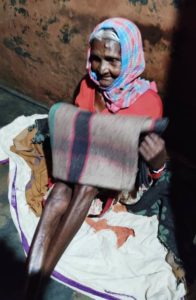

Christmas was very special this year. We had received sponsorship from ADP for this programme to have a Christmas dinner for a thousand children, the numbers went way over.
The main Christmas event we celebrated in the heart of Calcutta at the grounds of the Loretto School for the children of the Tangra Slum and everyone came dressed in their very best clothes. This is a predominant Muslim slum area and most of the people are labourers in the leather tanning industries.
We organized this together with Seva Kendra volunteers, who are actively working in this slum. With each group of 15 to 20 children was a volunteer. So it was a well managed event with great fun, games, prizes, carols, snacks and cake for all. An amazing day to remember. The pictures speak for themselves. Upon departure each child took home their Christmas dinner, chicken biryani, to share with their family. The biryani was excellent. I know, because when the cleanup was done and everyone was gone, I sat with my good friend Mr. Sethi under a tree where we enjoyed our Christmas dinner together.
The children in the Gurgaon school all received new sweaters sponsored by ADP to keep warm during the cold winter days. When I was there the temperature fell to five degrees Celsius, which is very cold as the houses don’t have central heating so it is the same temperature inside as outside. Making a bonfire outside helps the neighbourhood to get together in the evenings and warm themselves before tucking in for the night. You can understand the sweaters are well appreciated.
With thanks and appreciation
TSUNAMI RELIEF ASSISTANCE
WHEN AILA STRUCK
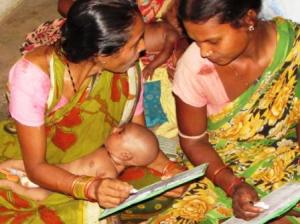
The tribal men and women from the Eastern Ghat mountains Odisha are learning to write their name, which is a tremendous boost in their self esteem. As you can see the people are eager to learn, but they are extremely thankful and happy that their children are getting schooling and are learning to read, write and do maths.
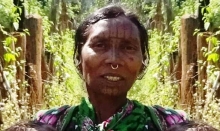
Putra Patamajhi the beautiful tribal woman who is learning to read
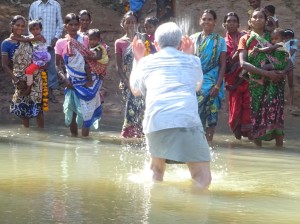
After giving the women a serious talk on adult literacy they walked us down to the river that our team had to cross. They were shocked when I started splashing them, but within seconds I got a full load back. Amazing, beautiful and fun loving India!
In the tribal village of Kadimaha Odisha we gave the challenge to the women to see who wanted to become proficient in reading. Putra, a strong tribal woman raised her hand. One is all we need. The teacher will teach her one hour daily until she can read and write well. I told her that I would be back to see her again, and that she needs to start reading books to the other village women. She was so thankful that someone showed faith and confidence in her. The village women walked our team of four back to the river, which we waded through. They also came into the water and they were so surprised when this “foreign dignitary” started splashing them. It was only a second before I got a full dose back. Great fun!
_________________________________________________________________________
IDENTIFICATION CARDS
Most of the children and adults that we work with have no identification. The children only know their personal name and their parent’s name i.e. My name is Shanti and my father’s name is Kumar. They don’t know their age nor their date of birth, so we sit with the parents guesstimate their date of birth, which becomes from then on their 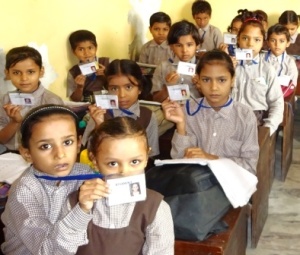 official date of birth. Before they have an ID anybody can snatch them and sell them in the market and there will be no trace of them. By giving them an identification card their confidence and sense of belonging grows as they can show who they are. Before the cards are endorsed by the society office with the proper stamp we put their name in our register, so we have the children and the adults on record.
official date of birth. Before they have an ID anybody can snatch them and sell them in the market and there will be no trace of them. By giving them an identification card their confidence and sense of belonging grows as they can show who they are. Before the cards are endorsed by the society office with the proper stamp we put their name in our register, so we have the children and the adults on record.

Our daughters have much greater value than gold

No positive comments for this tradition of dowry
Due to the dowry system in our Indian society, females are considered less welcome into our families as compared to their male counterparts. Parents have not only committed abortions of the females, but also female infanticide or the killing of baby girls after birth. Doctors have done sexual alterations so the girl would look like a boy. Can you imagine what this does mentally to the child? Due to this the girls feel like second class citizens and men feel they can use or abuse them either verbally, physically or sexually. If the husband or in-laws feel that the dowry has not been sufficient the newly married bride, who has now moved in with her husband and in-laws can end up living literally in hell.
Just in today’s local paper: “Woman set ablaze by in-laws for giving birth to a daughter” – “Minor girl (12) molested” – “Two women hurt in acid attack” – We all know the horror stories.
Is there a way out?
What can we do as parents? I met this confident outgoing lady in Gurgaon who was originally from Rajasthan. She was the CEO of a large Multi National Company. I asked her how it was as a girl to grow up in a society where girls were considered less welcome than boys. She explained to me that when she was born her father made the promise that he would not pay one paisa of dowry for her, but that he would give her the best possible education. This girl grew up with female confidence that she was different and special, because her parents treated her with equal rights and responsibilities of a son. She went to the best schools and did her best not to disappoint her parents. She now not only has a beautiful family with husband and two children, but also has hundreds of men working for her.
Another example: Anjali who was an orphan baby girl. The parents that adopted her were very thankful for her as they so much wanted a baby girl. She grew up confident because she received love. At a young age of 21 she operates a school-project in a confident, efficient manner. Being loved and wanted builds a strong character in your child. Being rejected breaks down the character and opens the door for insecurity and fear.
Let me give one more example: While on the flight Delhi-Kolkata I sat next to a charming young lady in her early twenties from West Bengal. She came from Germany where she was studying as she had received a scholarship from there. When we got to talking about the different educational projects, she said, “Oh sir, I am just so thankful that you help the poor with education. You see my father is a very small man, he is a pan-wallah, but my parents loved me so much that I wanted to be the best daughter they could have, because they gave me so much love.” At birth, was she dealt a bad card economically? Yes! Did it hinder her parents from loving her? No! Here again it shows that love, which is equal to genuine acceptance, is the best ingredient to develop not only the child’s character but also the brain. I affirmed that her father was not a small but a brave man as we are taught by Gandhi,“A coward is incapable of exhibiting love; it is the prerogative of the brave.”
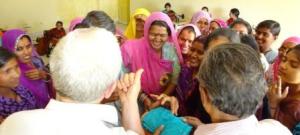
Confidence is built by acceptance, communication and sometimes just fun and enjoying each other’s company.
As you see from these examples, we don’t have to be ruled by traditions and financial burdens of dowry which have been handed down to us from generations past, which take the joy out of our lives.
If we as parents can be proud of our daughters, we will grow a crop of leaders that can and will lead us into a future that will not be restricted by the fears of certain past traditions that have handicapped us from welcoming daughters into our families.
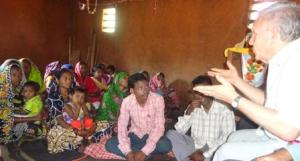
Explaining to the tribal women the importance of literacy and not only for the children, but also for them as adults
_________________________________________________________________________
TEACHER AND PARENT SEMINARS
Many of our teachers come from the villages where the Learning Centres are. They are usually the only person that is educated enough to properly read and write and knows math and a little General Knowledge, so training is extremely important for the benefit of the teacher but mainly for the children’s education, which is our focus.
For us it is very important that the child is treated as a human being with feelings and needs proper explanations to its questions. How to teach is very important: No yelling, No Latti, No abusive language, How to avoid difficult situations, When the class gets rowdy, simply take out the one person that started it instead of getting upset with the whole class. The simple basics of teaching that can either make you have a good day with the children or an extremely frustrated day. When you get frustrated and start yelling then the children have won and you are the looser as you lose their respect and they will try again to see if you will get upset. If however you keep calm and keep simply explaining soon you will win your class over to your side.
FOR PARENT MEETINGS
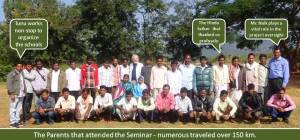 We discuss with the parents. Explain to them that the child stays totally their responsibility and although the teacher can help build their character, the ultimate responsibility lies with the parents, as God gave them the child and not to the teacher. If they feel something is not right with the teacher or the guardian of a hostel, they should not be afraid to report it as they are the ones ultimately responsible for their child and they need to keep a watchful eye on their child at all times. By listening to their child they can develop an open relationship that is only for the child’s benefit.
We discuss with the parents. Explain to them that the child stays totally their responsibility and although the teacher can help build their character, the ultimate responsibility lies with the parents, as God gave them the child and not to the teacher. If they feel something is not right with the teacher or the guardian of a hostel, they should not be afraid to report it as they are the ones ultimately responsible for their child and they need to keep a watchful eye on their child at all times. By listening to their child they can develop an open relationship that is only for the child’s benefit.
We have heard such beautiful words of thanks. Every little school has a village school committee that oversees the teacher and discusses the needs of the children. All the parents without exception explained with words of thank how the people that last year refused to talk to each other are now communicating because of the needs of the school and the children. Miracles of the heart.
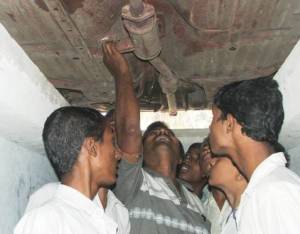
Motor Mechanics
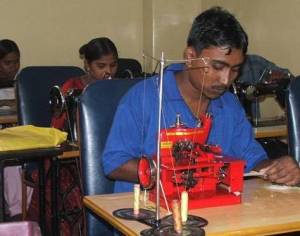
Advanced Sewing Course
As we started it became clear that we could not just educate the children while the family went hungry, so we started giving vocational training: first sewing classes, then woodwork classes. We expanded to motor mechanics and computer classes. Besides the school children, also hundreds of adults have passed through the courses.
Successful Students From the Vocational Training Course
Sewing
Tapan Bar from Dhanpota village.
Tapan has no land for cultivation. He lives with his wife and two children together with his elderly mother in a mud house. They were what you might call the ‘poorest of the extremely poor’. But he completed the sponsored Sewing Course he is now working in Kolkata in the Garment Company “Vest”.
Tapan is thankful because he now has a steady monthly income of Rupees 5000.-.
Carpentry (temporarily discontinued for lack of students)
Amrita Bar of Darrirchak village.
Amrita’s family has one bigha of low land for rice cultivation. He lives together with his two other brothers and mother. After finishing the carpentry course Amrita started a small home industry making furniture and selling it.
His business is doing well and he is making monthly Rupees 6000.-.
Computer
Hayatur Rahaman Molla from Magrahat.
Hayatur lives with three family members and they have no land for cultivation.
He has opened a Desktop Publishing Centre and photo Printing Shop in Magrahat. He also sells stationery, envelopes, greeting cards and post cards.
He is earning around Rupees 5000.- every month.
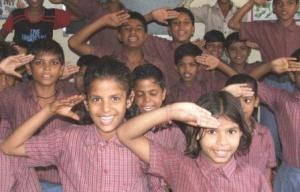
Gurgaon: Believe me, these children are so thankful for an opportunity to get educated
WHY DO YOU GIVE SPONSORED EDUCATION?
I have spoken to people who asked me “why do you want to educate them? They have lived like this forever. It is no use.”
Listen to some of the children:
 Gurgaon, Haryana: My name is Jatin. My parents live in the village and I live with my older sister in Gurgaon, because I want to study and there are no proper facilities in my village. My parents are not able to pay the school fees. But in Marudyan Learning Centre I get free education and I can build my future and I am very thankful for the help we get. (Dr. Rajeev said that Jatin is very malnourished. Jatin has spots on his face and body and many white hairs. He is doing better since we serve the midday meals)
Gurgaon, Haryana: My name is Jatin. My parents live in the village and I live with my older sister in Gurgaon, because I want to study and there are no proper facilities in my village. My parents are not able to pay the school fees. But in Marudyan Learning Centre I get free education and I can build my future and I am very thankful for the help we get. (Dr. Rajeev said that Jatin is very malnourished. Jatin has spots on his face and body and many white hairs. He is doing better since we serve the midday meals)
Gurgaon, Haryanan: My name is Sonu. My father name is Mr. Mr. Munim Ansari. There are 5 members in my family. I am studying in Marudyan Learning Centre. I belong to a family which is not in a good condition. My father works very hard for our living. He hardly earns 3000 to 3500 in a month. With this amount, it is very difficult to complete all expenditures of the family, but then also he wants me to study, so that I can become a worthy human being in my life. But he cannot afford the high fees of the schools, Marudyan school in which I study for last one year has helped us very much. If this school does not support us then I never would study in my life. For this help my all family is very grateful to my school.
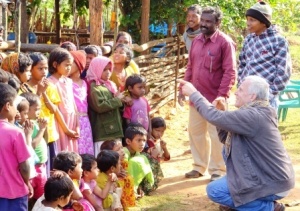
Odisha, Eastern Ghat jungles: These children are now learning. They and their parents are just so thankful
 Dhanpota, West Bengal: Hi I am Shuleka Chakraboty. I have always studied in Marudyan School and passed as best student of my class. We are 3 brothers and 3 sisters. My older sisters are married one has 1 child and the other has 2 children. Our family lives in a mud-house. My father is Krishnachandra Chakraborty and he used to ride a cycle-van (this is a bicycle with carrier that can carry goods or people). My father is 60, he is just recovering from tuberculosis so he is now physically not capable to do this work. For me to continue my studies in 11th and 12th grade I need to pay 1400 rupees to M. A. V. M. School for admission charge, but we don’t have the money. At present I am learning to sew at the Marudyan Vocational Training Centre, so I can earn some money. I would very much like to finish my studies and become a teacher. My parents would like me to finish my studies, but cannot afford to pay for me. I humbly request Calcutta Marudyan to help pay for my studies.(Calcutta Marudyan has paid her admission fee and has bought a set of school study books for her to use. These books will remain property of the society and are to be returned when her studies are finished)
Dhanpota, West Bengal: Hi I am Shuleka Chakraboty. I have always studied in Marudyan School and passed as best student of my class. We are 3 brothers and 3 sisters. My older sisters are married one has 1 child and the other has 2 children. Our family lives in a mud-house. My father is Krishnachandra Chakraborty and he used to ride a cycle-van (this is a bicycle with carrier that can carry goods or people). My father is 60, he is just recovering from tuberculosis so he is now physically not capable to do this work. For me to continue my studies in 11th and 12th grade I need to pay 1400 rupees to M. A. V. M. School for admission charge, but we don’t have the money. At present I am learning to sew at the Marudyan Vocational Training Centre, so I can earn some money. I would very much like to finish my studies and become a teacher. My parents would like me to finish my studies, but cannot afford to pay for me. I humbly request Calcutta Marudyan to help pay for my studies.(Calcutta Marudyan has paid her admission fee and has bought a set of school study books for her to use. These books will remain property of the society and are to be returned when her studies are finished)
We would like to work hand in hand with active members of society who want to do their part to make this world a better place with a brighter future, where every child born in this world will have the opportunity to grow up with love and an adequate education to develop the God given talents that he or she is endowed with at birth.

Devilal Colony, Gurgaon, Haryana: Children get a good midday meal after morning school, before going home
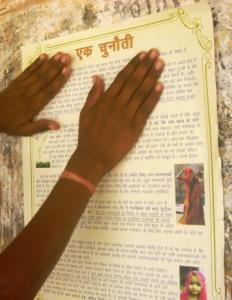
We put up hundreds of posters about the value of life.
On June 20th. 2011, was the shocking TV programme about the baby girl infanticide in Rajasthan, ![]() Jaisalmer area. In this programme Preeti Choudhry stated:
Jaisalmer area. In this programme Preeti Choudhry stated:
“According to unofficial estimates, nearly 2500 cases of female foeticide or female infanticide take place in the state of Rajasthan everyday – Midwives say girls are being disposed off ruthlessly – 14 cases of possible female infanticide in three months in a single village.,”
We were shocked and immediately visited many villages in the area to see if this was true. We came up with the ratio of 1 girl to 8.4 boys. This was too hard to believe and seeing our statistics were done by word of mouth, we would prefer to go by the Official Government statistics
2001 According to Indian census, Jaisalmer district’s population is 5,08,247.
Male constitutes 2,79,101 females 2,29,146. Mother nature sends us slightly more girls than boys. That means at least 50,000 females, or 1 out of 6, are missing.
Sex ratio 2011 Official statistics: Sex ratio of 849 females for every 1000 males: 1 out of 7 females did not survive and this is not malnutrition.
Some of the most beautiful people in the world “the Bhati Rajputs” needed our help to break this centuries old tradition, as approximately a staggering 50% or 1 out of 2 of the baby girls born to Bhati Rajputs did not survive.
2012, January 9th: Attended “Pravasi Bharatiya Divas” with many PIOs (Person of Indian Origin), who were invited to invest into our beautiful Rajasthan; distributed 27 reports of our findings; met many dignitaries; handed reports to ministers and key dignitaries.
Shortly after this Jail Sentences were given for the killing of the baby girls and it was all over the local newspapers. THE FEMALE INFANTICIDE HAS STOPPED ! ? ! ? ! BY THE GRACE OF GOD MAY THIS BE TRUE. Also Amir Khan dedicated a TV programme on the subject and gave it more publicity.
Women are still seen as a liability, mainly because of the ex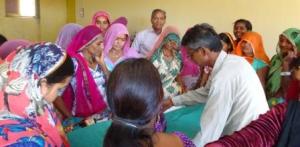 treme high dowries.
treme high dowries.
We focus on Female Confidence Building through vocational training and English classes.
At present 50 ladies who are thrilled to open up and come out from behind the veil where appropriate. Meet the beautiful women from Jaisalmer.
Don’t you think that instead of the bride’s parents, the man ought to be man enough to pay the dowry for the beautiful woman that he marries ? Our culture is beautiful but this heavy yoke of tradition should be removed, so our girls won’t feel like a burden and second class citizens.
In Ranisar Katchi Basti (Jaisalmer) we operate have a small slum school with 42 children.